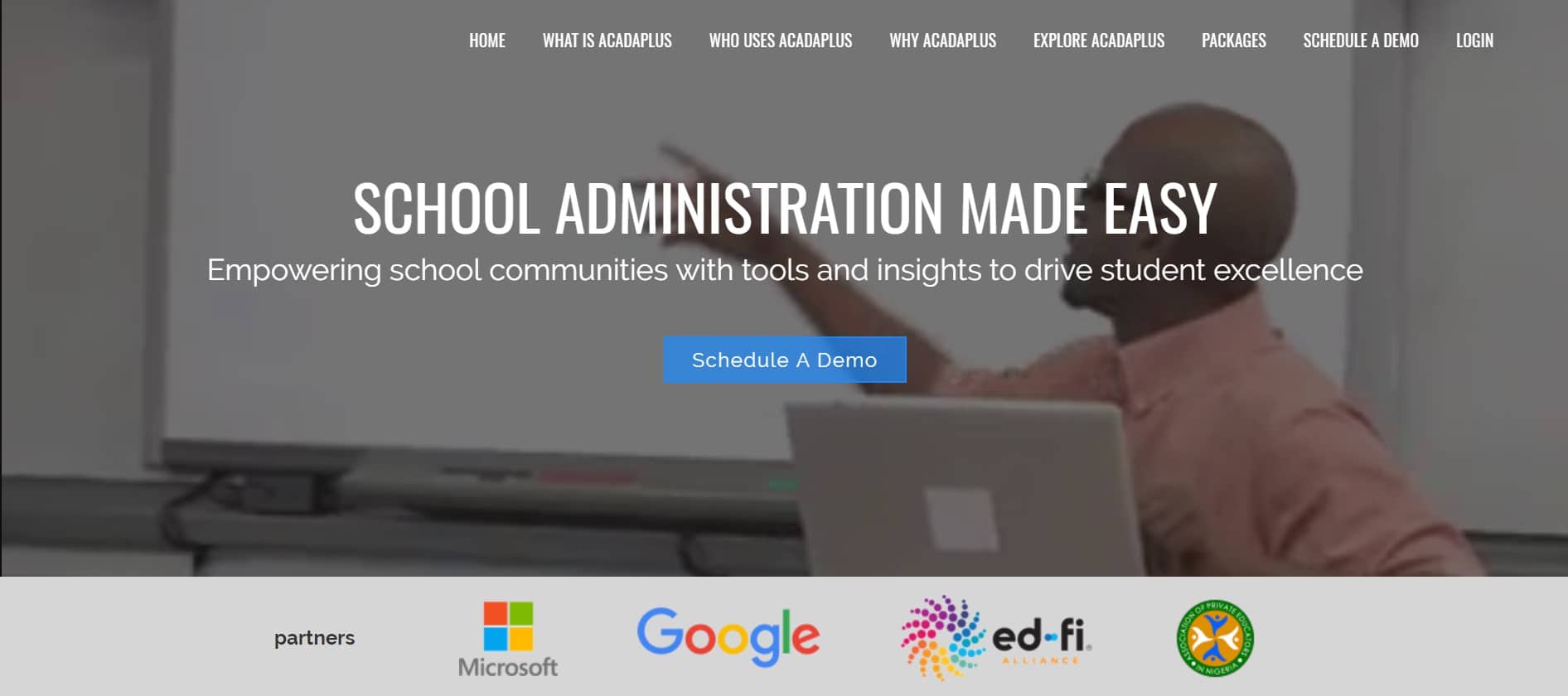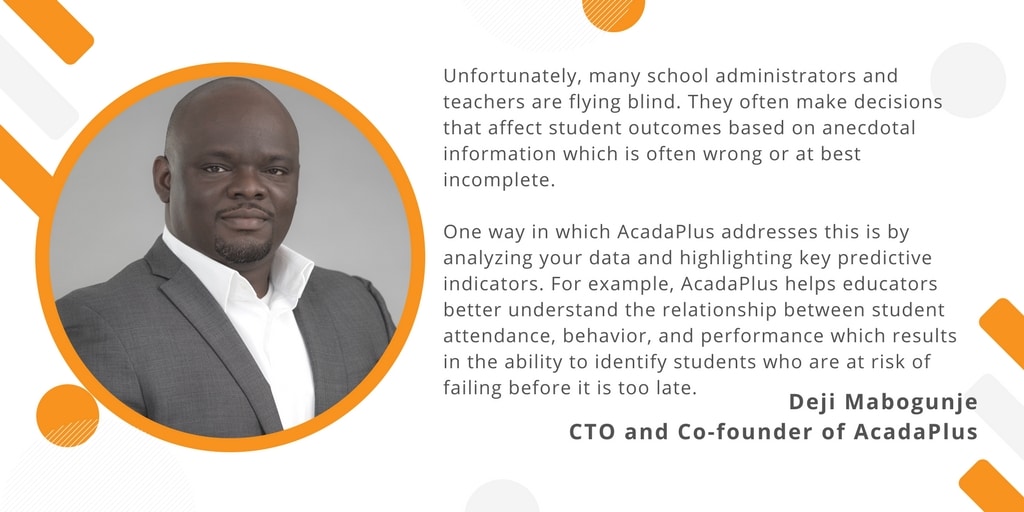Transforming the Educational System Through Technology: Big Idea, Challenges, and Things to Do
Edtech – the promising combo of information technology and education – is getting traction all over the world. The performance management system is getting must-have.
The global spending on edtech is expected to hit $252 billion by 2020 with financial support coming from public institutions, governments, and NGOs.
While the niche is certainly promising and delightful to pursue due to the social component, a lot of entrepreneurs are intimidated by the challenges edtech poses.
Recently, I sat down with Stephen Ovadje and Deji Mabogunje, Founders of AcadaPlus and our amazing clients, about the use of technology in education and improving performance management in educational institutions worldwide.
To give you some background, AcadaPlus is a new school management system and analytics platform, which allows schools to leverage data to improve students’ academic performance, and offers tools to enhance teacher and administrator productivity.
We hope that after reading this interview, you will get more insights of the edtech space, common challenges, and the product development process.
Now, let’s meet Stephen and Deji.
Table of Contents
How Technology Is Transforming Education: The Idea Behind AcadaPlus

Stephen Ovadje together with Deji Mabogunje launched AcadaPlus with one big question in mind – how do we create a school management system that leverages data and helps improve the quality of education?
Fueled by their shared passion to improve lives back in their home country, Nigeria, Stephen and Deji have started working on the MVP.
“There were three key trends that we wanted to take advantage of”, says Stephen.
One was smartphone penetration. More and more people now have access to smartphones even in developing countries.
Secondly, cloud computing. “Now, if I own a small business, I don’t have to buy a thousand servers, I can subscribe to different services from different technology providers; even as a software company, I don’t have to invest heavily in infrastructure. I can rent infrastructure from the cloud”.
The third trend is big data. More and more people are more comfortable with sharing personal information than ever before.
These three trends have created an opportunity gap for Stephen and Deji. Deploying and distributing technology, leveraging a low cost, scalable infrastructure, would make technology solutions accessible and affordable to small business and educational institutions in Africa.
“We picked education as the first sector to focus on because we felt that’s where we’ll be able to make the most impact,” – says Stephen.
“Unfortunately, many school administrators and teachers are flying blind. They often make decisions that affect student outcomes based on anecdotal information which is often wrong or at best incomplete,” – adds Deji.
“One way in which AcadaPlus addresses this is by analyzing your data and highlighting key predictive indicators. For example, AcadaPlus helps educators better understand the relationship between student attendance, behavior, and performance which results in the ability to identify students who are at risk of failing before it is too late.
This is the true value of the AcadaPlus platform, it gives educators useful, timely and actionable information which empowers them to make sound data-driven decisions that improve student outcomes.”
The founders specifically chose Nigeria as it’s their home country and, at the same time, a place with high potential for educational transformation. “Given the market size and potential, Nigeria presents the optimal testbed for our product. If we are successful here, we will expand to other countries”.
Q: What are your goals as a socially responsible startup?
Before even getting started with software development, we learned that not a lot of schools in Nigeria even use data today or have a way of digitizing their records.
Most schools today still rely on paper-intensive, manual filing processes in cabinets, things like that. Some teachers still take attendance on a ledger or notebook.
So that’s an issue, right?
Consequently, we realized, we had to provide them with the tools to first digitize their records and streamline processes, and also get them comfortable with using technology in the classroom before we can get to the bigger goal.
Next, we needed to change their attitude and shift the mindset towards something like:
“Okay, now that I have that data, how do I understand the trends that I’m seeing, and how do I feed that back to the teacher and back to the parent and back to the administrator in a way that helps them improve on what they are doing, improve their productivity and also provide them insights on how the children are actually performing in order to drive improvements there?”
That’s one big issue with technology and education today – demonstrating to the target user groups how they will benefit from the innovation and how much value they are getting in return.
Most emerging technologies in education have this challenge in adoption. Educators, administrators, policymakers, and parents need to be educated on the specific benefits and their return on investment.
People are used to doing things the old way and challenging the entire ecosystem is quite a daring and indeed, big goal ☺
However, we do have massive support from the younger generation – Millennial and Generation X teachers and students, who feel comfortable with the modern technologies and social media tools. When we show them our cloud-based solutions, they get it and feel excited.

Q: So how are you addressing these adoption challenges?
One of the things that we’ve done as part of rolling out our product is we’ve hired folks that we call data ambassadors.
Generally, they’re like client success specialists. What they do is, when we have implemented our online performance management system in the school, the data ambassador visits the school frequently, at least two or three times a week, to work with the teachers/administration – answer what questions they have, point them to features that we continue to develop, and get their feedback on the solution.
As opposed to relying exclusively on phone or email support and waiting until users have a problem, ambassadors proactively spend time with users, observe them using AcadaPlus, point them in the right direction, and as they have issues or issues arise, address them immediately.
So far this approach has yielded great results.
Q: Apart from adoption, did you face any other technical challenges on your way?
Internet infrastructure is definitely one of the biggest challenges right now.
When entering a developing market/country, you should certainly account for that. Yes, people have smartphones with data plans and all that, but for a cloud application to work obviously, you need the reliable Internet.

So far we have to focus on urban areas where that infrastructure already exists. Also, where it exists you have people with varying qualities of access to high-speed Internet. It’s a challenge we’re working through by actually partnering with local ISPs (Internet Service Providers).
We have a partnership with a smaller ISP called EkoVolt, and when we encounter a potential client that has that issue we refer them to EkoVolt. They work with them to get them set up. We’re also working on a partnership with a larger local ISP provider as well.
Another challenge we faced was to find a reliable outsourcing software development vendor that will be able to pick up the project quickly and will be skilled in terms of Java technology. Romexsoft turned out to be the partner we were looking for. The developers are highly skilled and show great results regarding code quality and on-time delivery.
Q: What’s your business model? Do you plan to monetize your product or keep it as a social project?
We like to define our business model as a social entrepreneurship for profit. So yes, we definitely plan to monetize the product.
We charge schools and educational institutions a subscription fee. Right now we have two pricing tiers live, but we have a third tier that we are going to have available once the developers have all the features ready.
What we are trying to do on the social side is to really partner with local governments and figure out a way to provide them with the basic package, which covers the very minimum you need in order to digitize records and introduce effective performance management in schools.
Specifically, we focus on five key functions:
- Setting up the school and classrooms;
- Setting up the student and staff directory;
- Taking attendance;
- Providing an ability to grade assignments;
- Generate basic report cards.
Although, we are a for-profit company, we plan to extensively partner with NGOs and the government to offer subsidized or free technology to the schools, which can’t afford our cheapest plans.
Our goal is that by 2020, we should be in a place where we have a good mix of both public and private schools in our portfolio, as well as strong partnerships with NGOs and s governments, on local and national levels.

Q: What do you think about the future of the edtech market? How is technology transforming education?
EdTech market in Nigeria right now is very-very young.
There are few players in the space that are focused on both the school administration side and the learning management side, but there’s not really one clear dominant player at this point. There’s not a lot of funding in the space as well, so you’re not seeing a lot of VC money.
In two years, I would expect some improvements but not a drastic transformation.
I think there’s a lot more awareness that we have to push through so that schools have a better appreciation of the value that edtech brings to them.
We have to demonstrate how edtech not only improves outcomes for their students, but also improves their bottom line in terms of enrolment, student retention, and income for the private schools.
Also, I believe that edtech companies need to partner and communicate better with one another so that we can get more awareness both to potential clients and to the investor community.
Specifically, our campaigns should not exclusively promote our self-interest as a company, but also promote the interests of the collective edtech community. We have to compete with each other, but we also have to partner in a way that grows the size of the market in general; in that case, we all win.
Q: What would you recommend to other young entrepreneurs who plan to build a socially responsible tech startup?
Before you go all in, do your research, that’s the biggest thing that has helped us.
Go into the market, understand who the key players are, what they’re doing, what they’re doing well, what they’re not doing well so you can identify where you would fit in within the marketplace.
Talk to your potential clients so you could understand exactly what their pain points are. So, when you fashion your solution, it should address those specific concerns.
Build your product roadmap in a way that allows you to test the product quickly, and also tweak it and improve continuously.
If you ask me, how to develop a performance management system that gets traction, I’d say – start with a very slim down dummy prototype that you can put in front of potential users. Next, let them poke holes in it, question it, and take notes.
Only after you have that initial feedback and an evaluation of your idea, you should start hiring a software development company.
This approach made it for us to scrap certain features and pivot very quickly to working on other features that proved to be more valuable to clients.
If you look at our product architecture right now, it’s also designed in such a way that it’s very modular. You can plug things in, you can take things out in a way that doesn’t disrupt the whole platform.
To sum up:
- Understand the market.
- Plan your product development in a way that allows you to fail without breaking the bank.
- Learn from your failures because it will help make you stronger.
- Build relationships. The social sector thrives on relationship building and networking. Building the right relationships with the right foundations, with the right non-profits, with the right government organizations. People that share the same goals as you do will make your life a lot easier.
- Find the right partner for your venture. My partnership with Deji works because we do challenge each other, we respect each other’s opinions, and our strengths complement each other well.
If you have your big idea in edtech and looking for the right partner to take care of the performance management software development, Romexsoft team would be delighted to help you and work out an elegant, efficient and innovative solution to transform the educational space.
Written by Romexsoft on October 19, 2017


